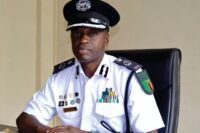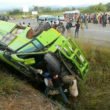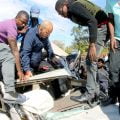Last week, Mr Zindaba Soko, the chief executive officer of the Road Transport and Safety Agency (RTSA), was involved in a road traffic accident along Kafue Road in which nine people were injured. According to the police, Mr Soko was wrong because he failed to keep to his lane, thereby, hitting the Rosa minibus, which was ferrying commuters.
This accident caused an uproar as people condemned Mr Soko for failing to lead by example. “This guy is just a careless driver, not long ago, he confessed that he also exceeds speed limits and also pays speed fines”, said one critic who further demanded Mr Soko’s removal from his position.
But Transport and Communications Minister Brian Mushimba, who superintends over the Agency’s operations, urged critics not to be heavy-handed on the RTSA boss, saying he is an exemplary chief executive with a clean record. According to the Minister, Mr Soko is a man who takes his responsibility very seriously and is fit for office because there is no pattern of wrong doing.
We can’t vouch for Mr Soko in a manner that the Minister is doing, and we are very certain that posterity will soon prove Mr Mushimba wrong when the skeletons at RTSA come out to disagree with his testimony. And it was strange that the Minister, who should be more worried with the near loss of lives, is the one laundering the culprit. Anyway, you can understand why considering that the Minister himself is still healing from a mysterious accident that has not been investigated or explained to the public.
We are not here to rubbish the good work that our Road Transport and Safety Agency does. We can actually attest to the fact that RTSA as an organization is a much more professional body when it comes to enforcing traffic laws than the uniformed police. Anyone who considers this as malicious on the police service simply has to check the corruption perception index.
As for Mr Soko as an individual, it’s easy for us to agree with the Minister that people should not crucify him for causing that accident because being in that office doesn’t make him more super human than we all are. He has five senses like any other motorist and at one point or another, he is bound to make mistakes – either out of human error or mechanical fault. Expecting Mr Soko never to cause an accident is like expecting a medical doctor not to fall sick; it doesn’t work like that.
But that said, our concern regarding that incident has still not been addressed. Our interest is the charge that was slapped on Mr Soko for causing the accident. Why was he slapped with “Careless Driving” and not “Dangerous Driving?” We are eager to learn the difference between these two charges so that as motorists, we can also defend ourselves when law enforcers wrongly accuse us of Dangerous Driving.
For those who don’t know, these two traffic offences are related, but different, with Dangerous Driving being a much more serious charge, which may lead to withdrawal of license, prosecution and even a prison sentence, depending on the fatality. What police officers and their RTSA colleague tell us is that Dangerous Driving means there was a danger of physical injury (however minor) or serious damage to property. The dealing officer does not have to prove that anyone was actually injured or that damage actually took place as long as it can be proved that your driving fell far below the expected standard of a competent driver.
In the case at hand, Mr Soko failed to keep to his lane, his car hit a passenger bus, which overturned; nine people were injured and there was extensive damage to both vehicles. This driving posed a danger to human life and did in fact cause damage to property. So, we called the police to ask: “Why was Mr Soko charged with “Careless Driving”, and what exactly constitutes “Dangerous Driving?”
The Deputy Police spokesperson who announced Mr Soko’s accident and the charged slapped on him could not give us a clear answer. “You can Google those things, just Google. I wanted to give you an idea, you read widely so that you understand. I would love you to Google so that you look at it from the Road Traffic Act so that you understand it,” said Mr Ray Hamoonga.
When we contacted the RTSA public relations manager, being a clever journalist that he is, Mr Fred Mubanga knew where we were heading with our enquiry and he quickly refused to say much, instead referring us back to the police for explanation of Mr Soko’s charge.
“What you are forgetting is that I’m a journalist like you and you cannot play on my mind to give an answer that will put me in a very compromising position,” Mr Mubanga told our reporter who called him.
“I think the police are better placed to answer that. You can always ask them why they have charged Mr Soko for Careless Driving not Dangerous [Driving]. It depends on what those on the ground have established and that’s what will constitute a charge. I cannot delve any further into this matter because the authorities that have given the statement are better-placed.”
But soon after our enquiry, RTSA issued a statement contradicting what the police had established at the accident scene. According to RTSA, it was the bus driver, who strayed from his lane, thereby, hitting Mr Soko’s car. The statement was on RTSA headed-paper and Mr Soko was regretting the accident, but at the same time declaring himself innocent. It was basically a case of a traffic offender being judge and jury in his own case. Surprisingly, though, RTSA has not charged the said bus driver with any offence.
We understand the predicament that the Police and RTSA have found themselves in. Like we said, there is nothing special about the accident that Mr Soko caused because even doctors fall sick. But we don’t want to treat Mr Soko with wrong medication. If a doctor has been infected with cholera, we cannot give him Benylin to save him the embarrassment just because he is a doctor.
Yes, Mr Soko is human and bound to make mistakes, but we would like to see him get the same treatment as any other motorist. If the law can be tilted in order to cut him some slack, the same must be done across all offenders.
RTSA must learn to be considerate when enforcing the law, especially when they establish that there was no intent to contravene traffic rules.
If it’s Careless Driving on Mr Soko, it shouldn’t graduate to Dangerous Driving just because the offender has no office at RTSA. That’s all we are saying.












